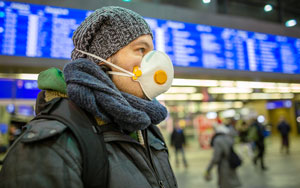 by Kayla Matthews
by Kayla Matthews
The new coronavirus, designated COVID-19 by the World Health Organization (WHO), has already infected nearly 60,000 people in China, and spread to 24 countries around the globe, including Japan, France, Canada and the United States. In a short period of time, the virus has quickly become a hugely disruptive health crisis that’s already having big impacts on the global economy — and especially on retailers, some of whom operate in China or depend on Chinese goods.
Here are four different ways that the retail industry is starting to feel the impact of the coronavirus:
1. Store and Office Closures in China
Major tech companies are closing offices, stores and factories in China over fears that their employees there could contract the coronavirus. The companies — which include names like Apple, Microsoft, Tesla and Google — announced the closures earlier this year. While the companies specified that the closures would last at least through February 9th, there was little information on when exactly their offices and stores would re-open.
These companies have also required that employees traveling in and out of China work from home for 14 days — the incubation period of the new virus — before returning to the office. The closures have impacted retail sales in China, but American retailers are likely to be more concerned with the continuing shutdown of many major factories across China.
2. Manufacturing Slowdowns
A number of Chinese factories have shut down as the Chinese government looks to limit the spread of the coronavirus. Factories are seen as creating especially high risk of transmitting the virus, due to the negative impact that factory working conditions can have on the human immune system. This has concerned Chinese public health officials, leading the state to shut down major factories around the country.
For example, working and living conditions at the Foxconn plant in Shenzhen led Chinese officials to prevent the plant from reopening earlier this year. As a result, Foxconn announced potential delays to the manufacture of new Apple AirPods and iPhones. While the plant is reportedly back online now, it’s running with a limited crew of around 20,000 workers — or 10 percent of Foxconn’s total Shenzhen workforce. Similar closures are being seen across China.
3. Sharp Drop in Imports Threaten the Supply Chain
The manufacturing delays have led to a sharp drop in Chinese imports in the United States. Retailers who depend partially on Chinese goods and raw materials are beginning to feel the pressure of these delays. The impact of the import drop hasn’t been too severe for retailers to handle, yet — industry experts worry, however, that if the import drop continues, it will likely cause serious disruptions to the supply chain.
“Many Chinese factories have already stayed closed longer than usual, and we don’t know how soon they will reopen,” said Jonathan Gold, the Supply Chain and Customs Policy VP at the National Retail Federation, in a press release earlier in February. He also added that “U.S. retailers were already beginning to shift some sourcing to other countries because of the trade war, but if shutdowns continue, we could see an impact on supply chains.”
The new trade deal between the U.S. and China seemed like it might provide some relief for retailers who have traditionally depended on Chinese goods and raw materials and had chafed under the new tariffs imposed by both countries. Now, however, it’s likely that retailers will need to wait longer for a return to normal access to the Chinese market.
4. Reduced Tourism Impacts Luxury Retailers
Chinese tourists are beginning to disappear from major cities around the world as a result of the new coronavirus limiting the travel of Chinese nationals. This impact is being felt by the U.S. travel and tourism industries, with the travel industry expected to take a multi-billion dollar hit as a result of the virus — as well as by luxury retailers in major cities, who have come to depend on sales from Chinese tourists and international students.
While there’s no estimate yet on how much money luxury retailers are expected to lose from the coronavirus, the industry is bracing itself for a downturn. Estée Lauder Cos. and Capri Holdings Ltd., the owner of the Versace and Jimmy Choo brands, warned their investors earlier this year that the coronavirus could potentially have serious impacts on the company’s bottom line.
How Retailers Can Get Through the Coronavirus Impact
While the impact of the coronavirus is already severe and likely to get worse in the near future, retailers still have options for responding to the virus’s impact. Continuing to source supplies and raw materials from outside of China will be a good strategy. Ideally, retailers should work to build a more resilient supply chain that would survive further production delays from China and the continued drop of Chinese imports.
Luxury retailers and stores that depend on tourists have less flexibility when it comes to responding to the effects of the coronavirus. These retailers may simply need to prepare themselves to ride out the temporary dip in tourist numbers.
How the Coronavirus Will Impact Retail
The coronavirus has spread rapidly, both in China and around the world. Now, the virus is starting to have serious impacts on Chinese manufacturing and threatens to disrupt the retail supply chain.
While retailers haven’t felt a strong impact yet, it’s likely that if the coronavirus continues to spread and factory closures continue, the import drop will begin to hurt the supply chain. Retailers wanting to prepare for this possibility should find new sources of non-Chinese goods and raw materials and prepare for long-term shortages.